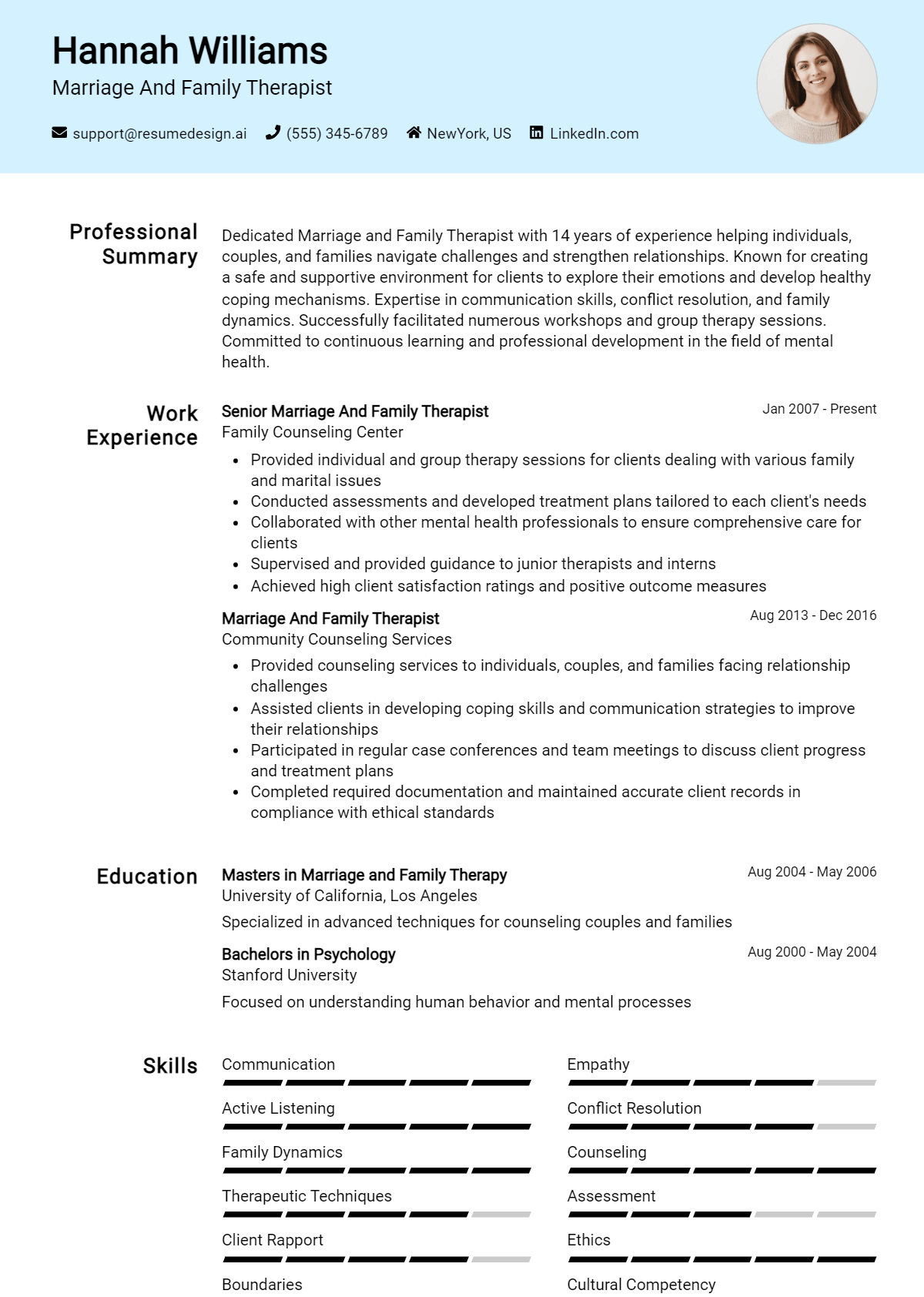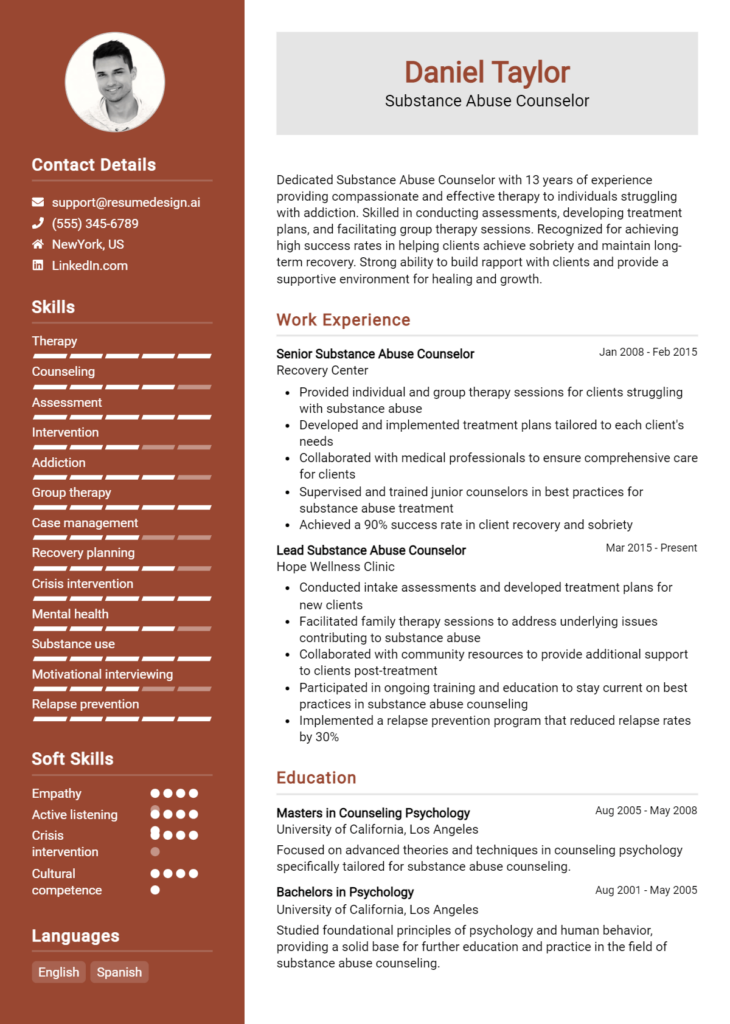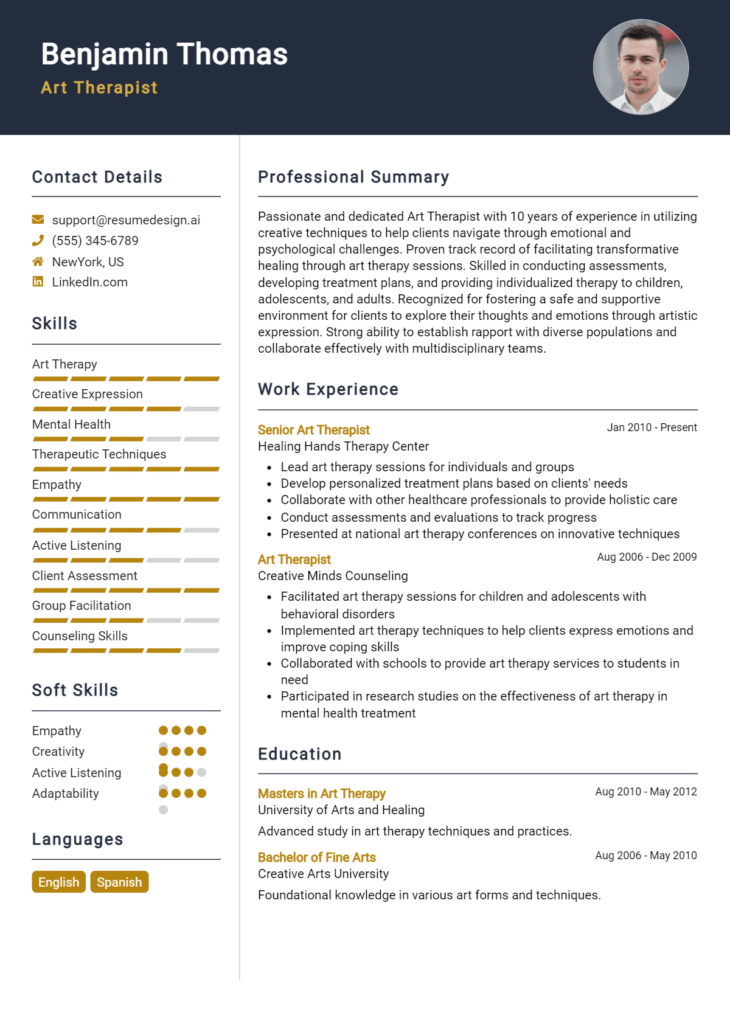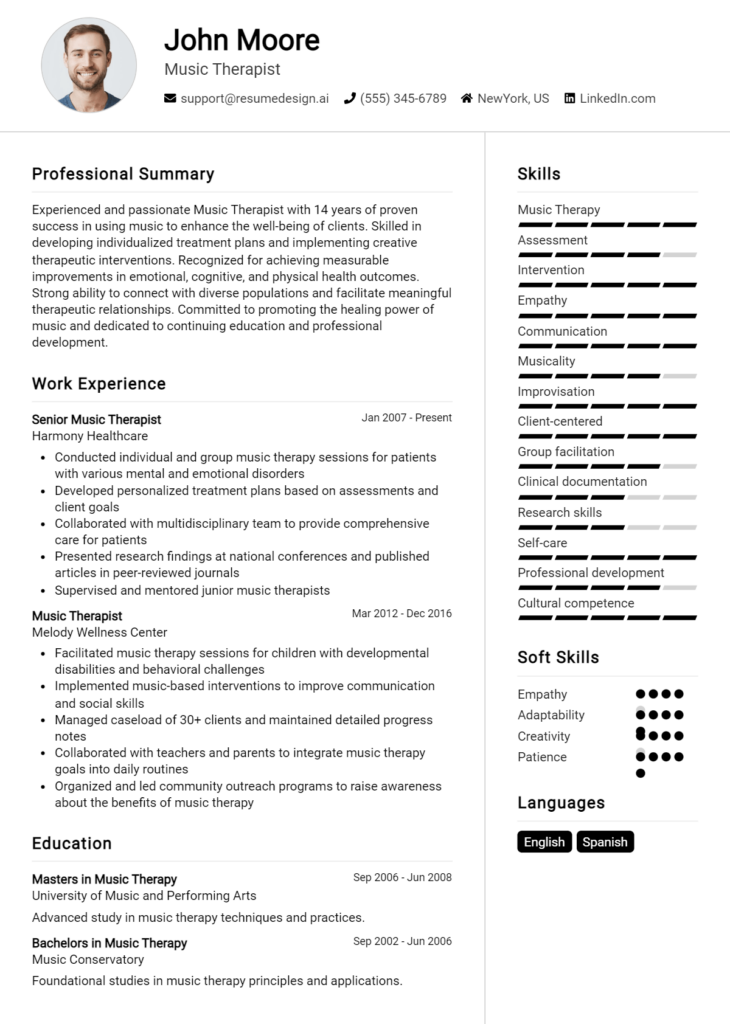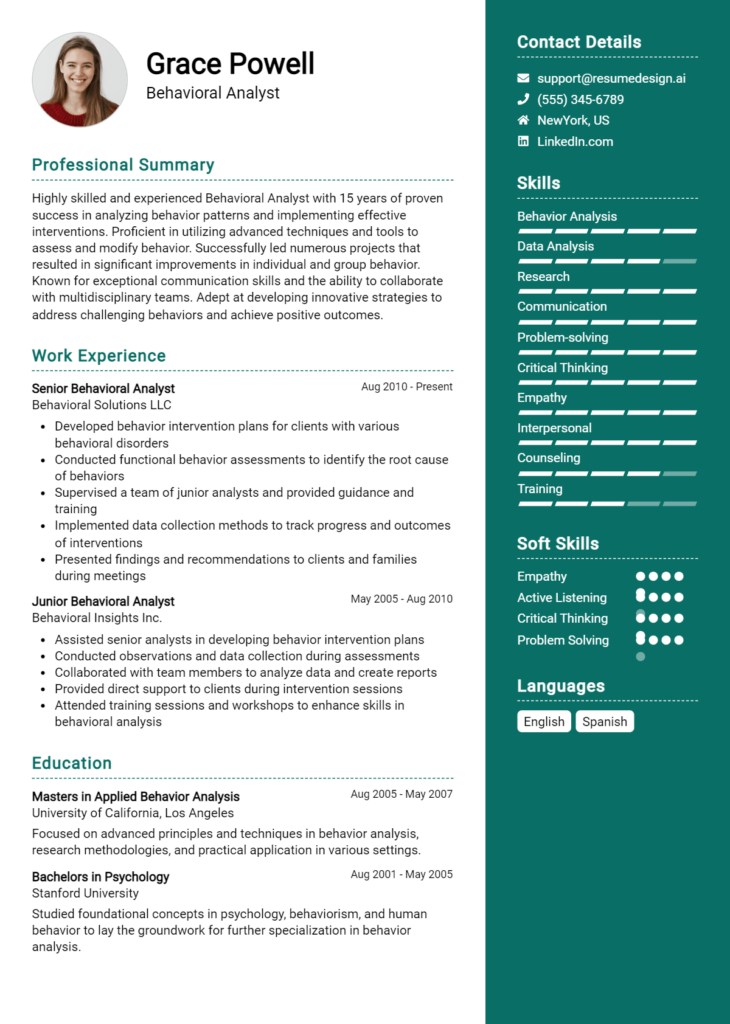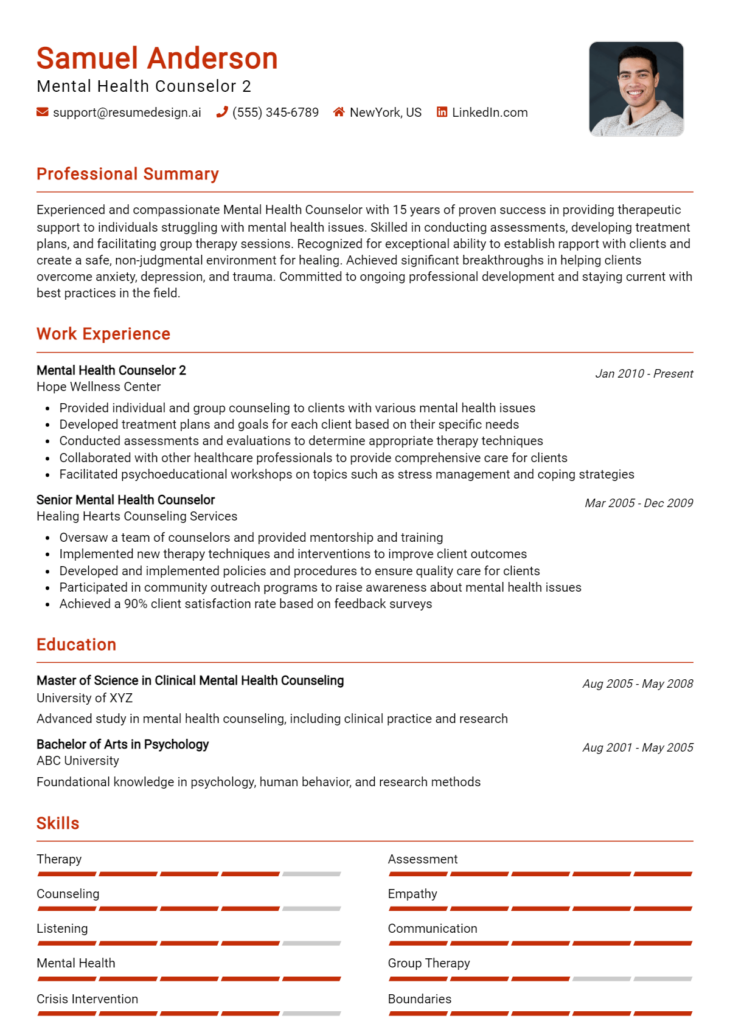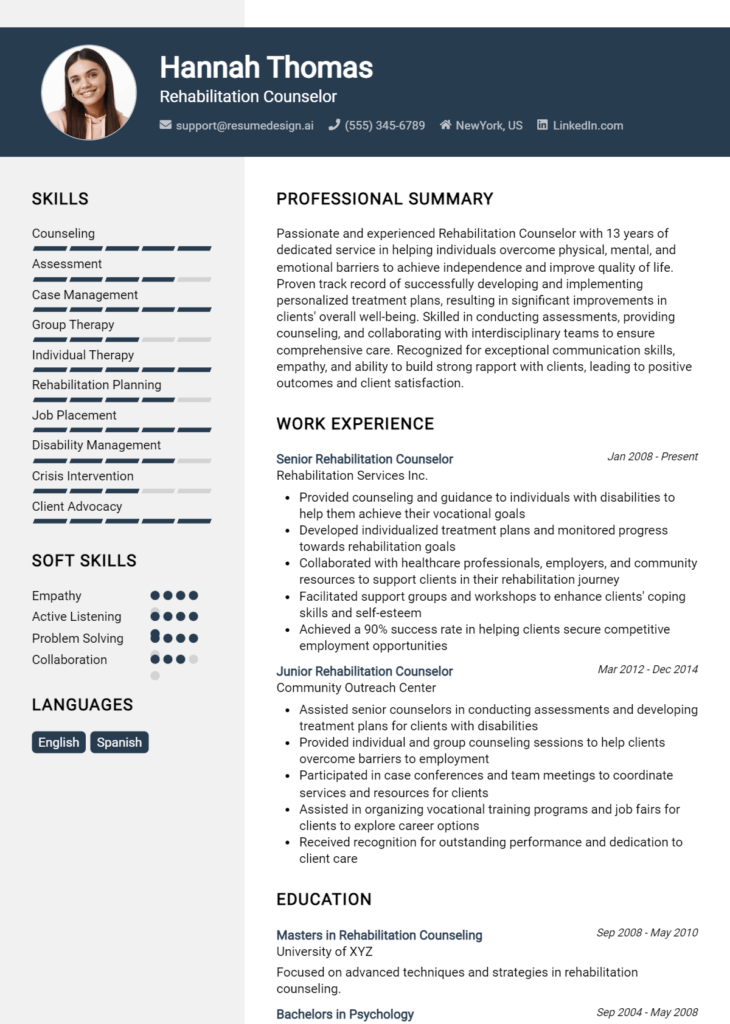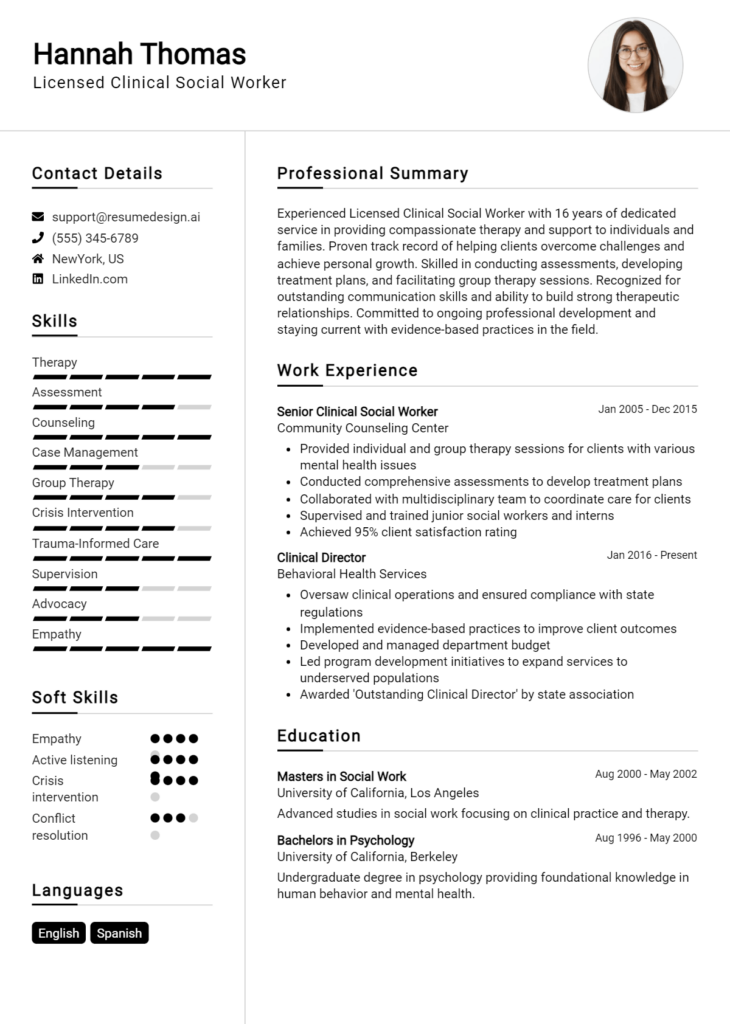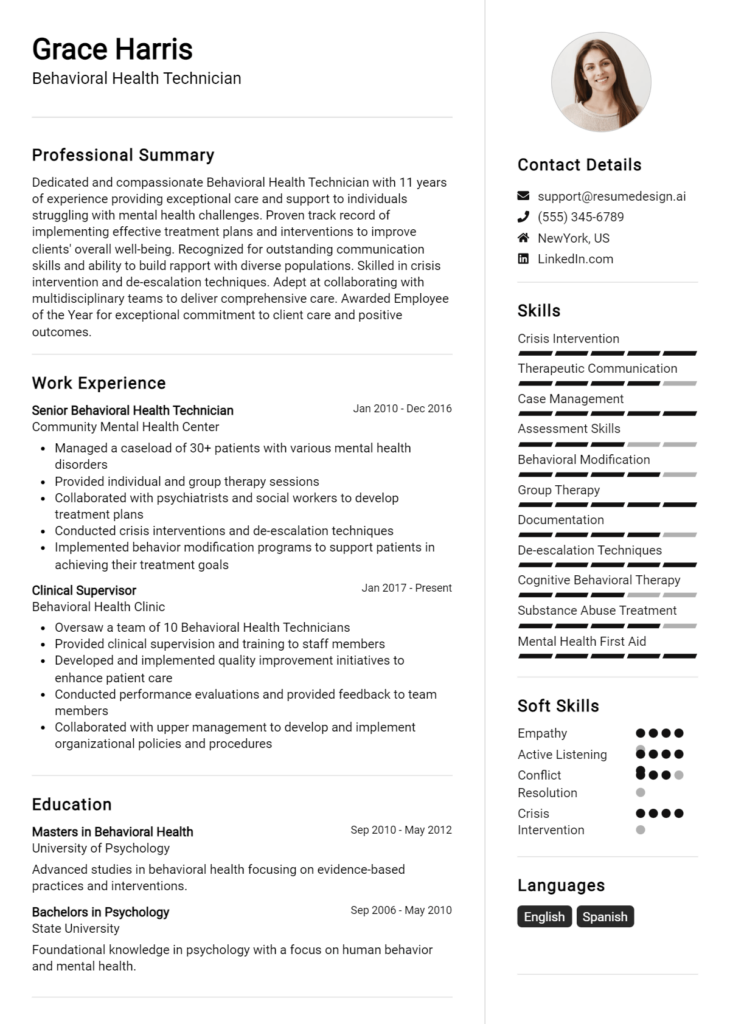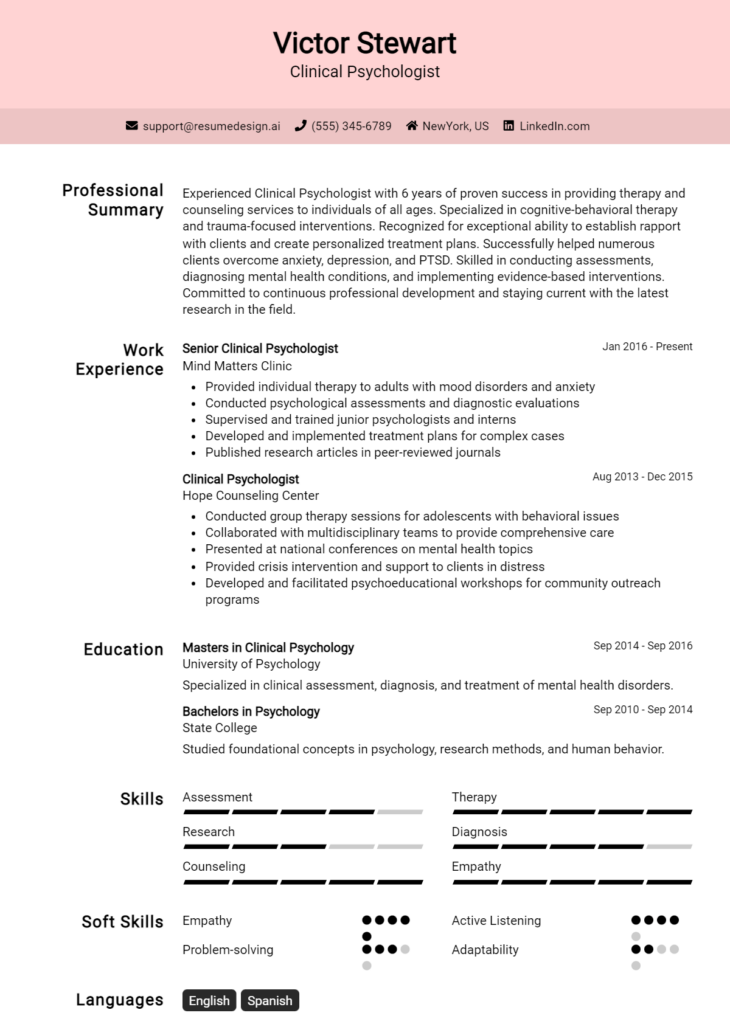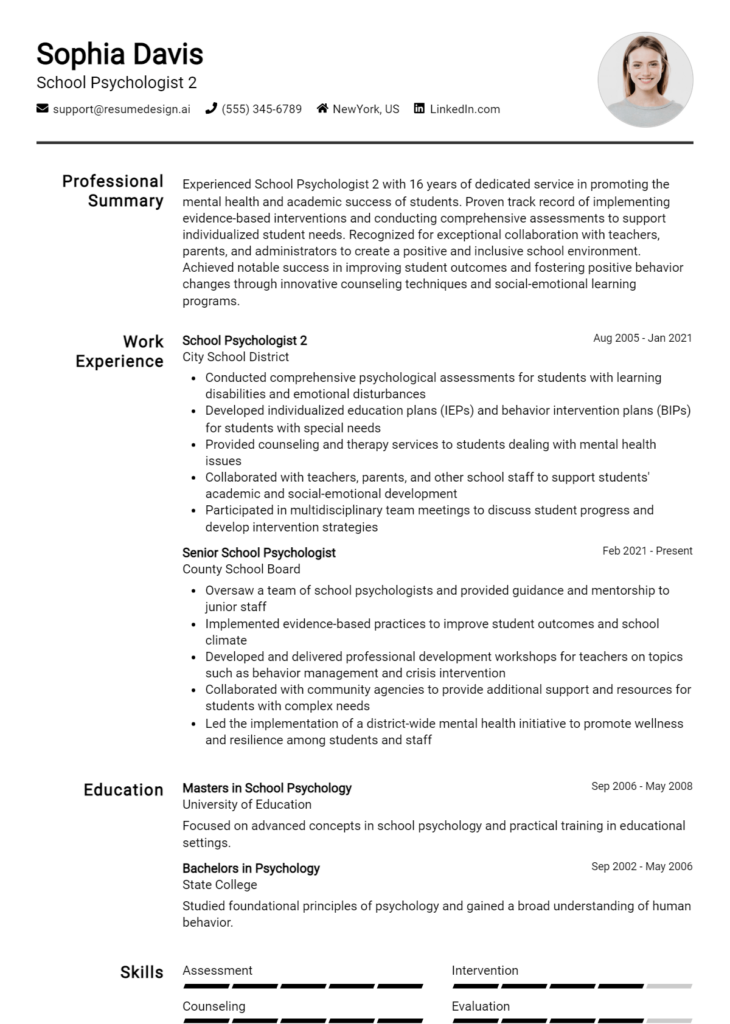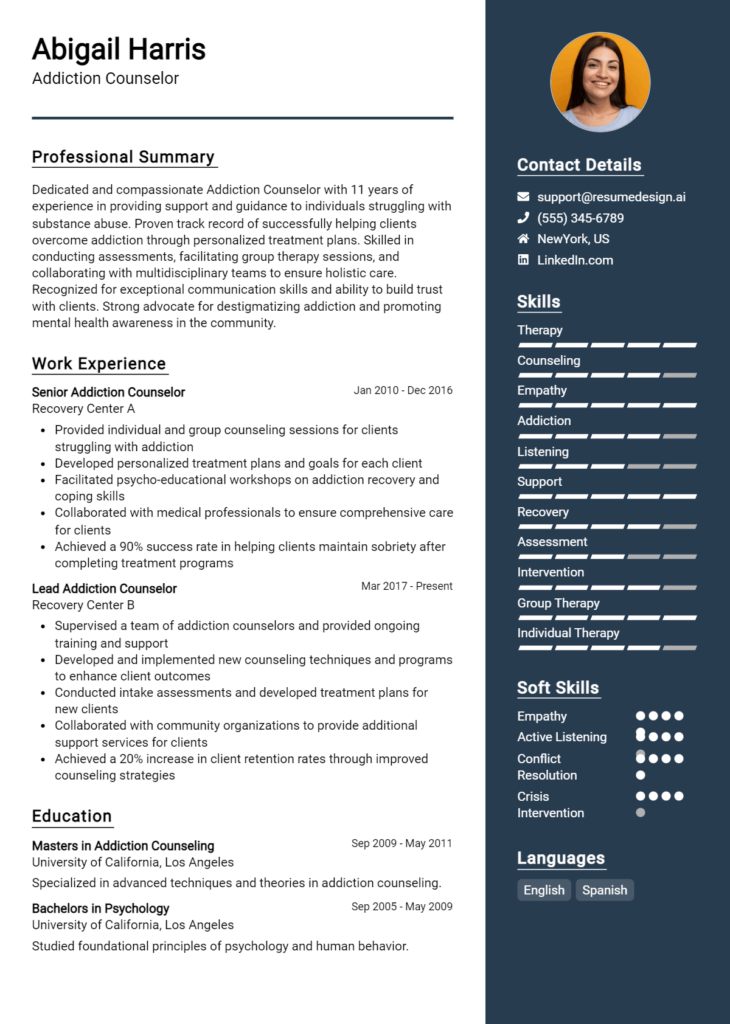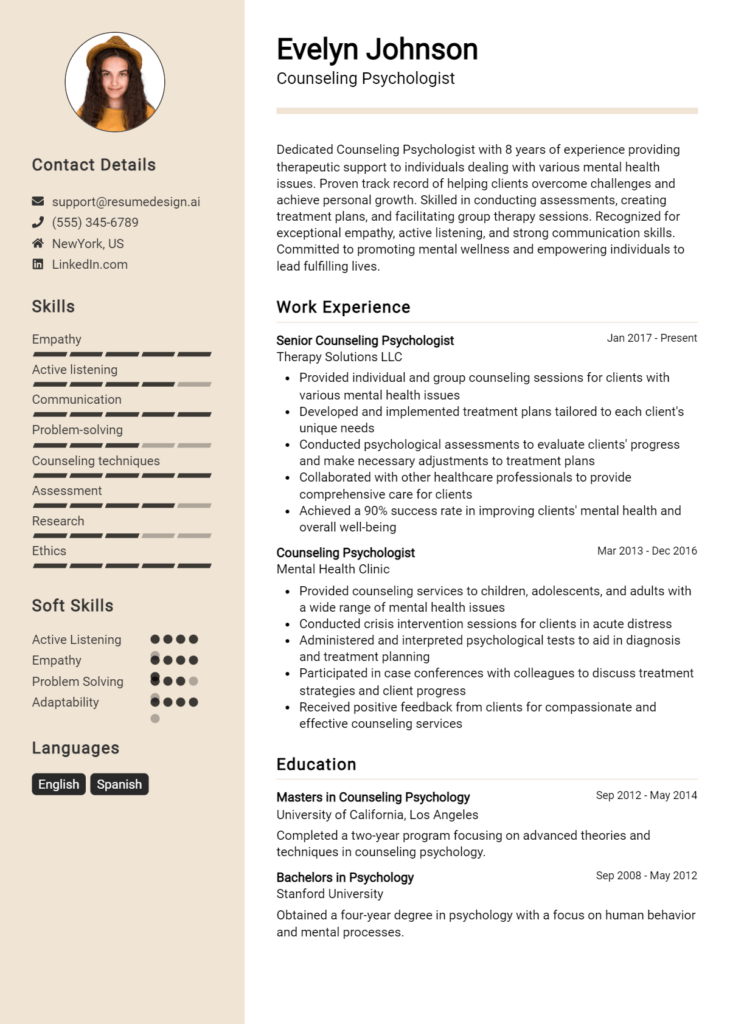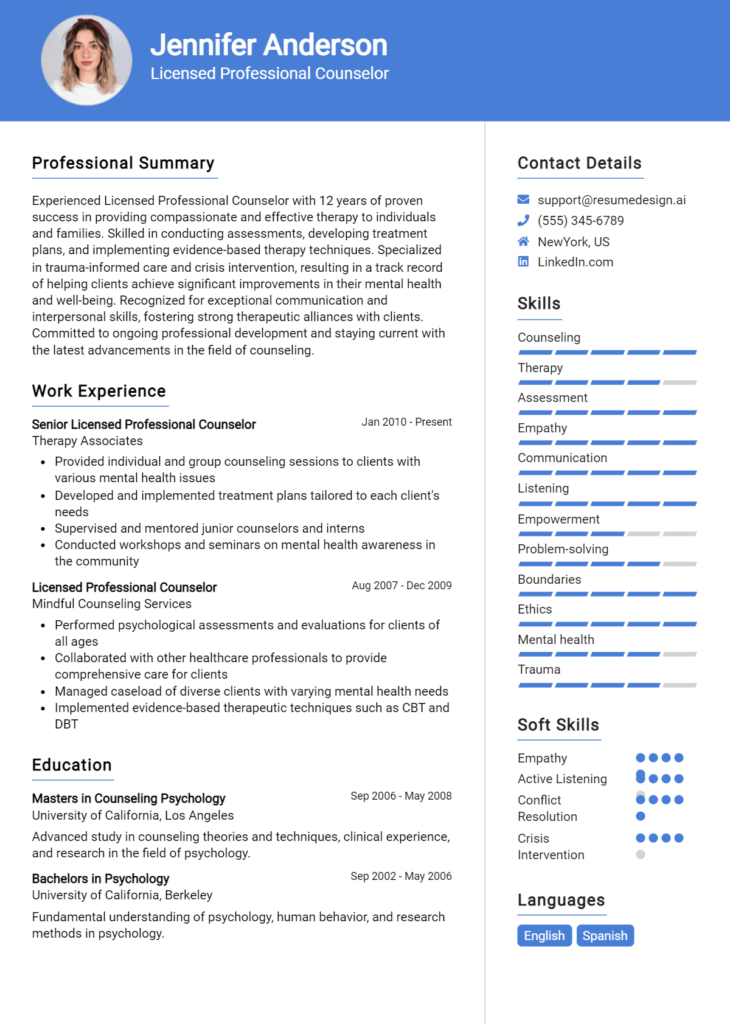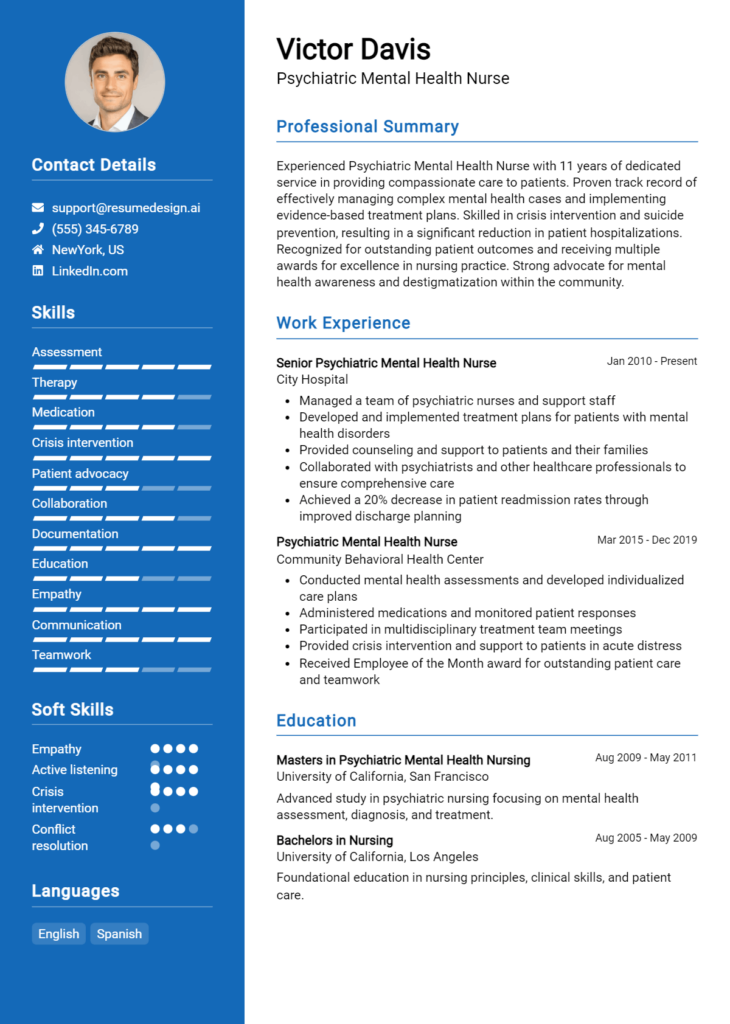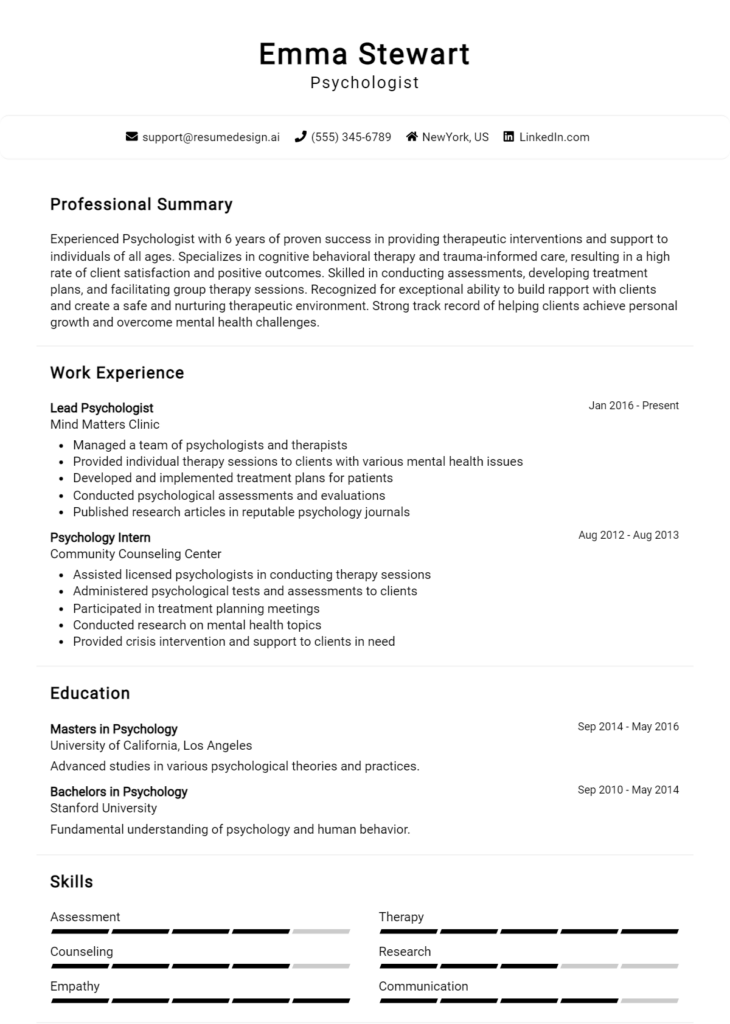Marriage and Family Therapist Core Responsibilities
Marriage and Family Therapists (MFTs) play a crucial role in fostering healthy relationships by providing counseling and support to individuals, couples, and families. Their key responsibilities include assessing clients' needs, developing treatment plans, and facilitating therapeutic sessions. MFTs must possess strong technical, operational, and problem-solving skills to effectively bridge the gap between clinical practice and organizational goals. A well-structured resume that highlights these competencies can significantly enhance their prospects in a competitive field.
Common Responsibilities Listed on Marriage and Family Therapist Resume
- Conduct individual and group therapy sessions.
- Assess client needs and formulate treatment plans.
- Facilitate communication and conflict resolution among family members.
- Maintain confidential client records and documentation.
- Monitor client progress and adjust treatment strategies as necessary.
- Collaborate with other healthcare professionals and community resources.
- Provide psychoeducation and coping strategies to clients.
- Conduct intake assessments and interviews.
- Engage in continuous professional development and training.
- Advocate for clients' needs within the larger healthcare system.
- Implement evidence-based therapeutic techniques.
- Support clients in developing personal goals and strategies.
High-Level Resume Tips for Marriage and Family Therapist Professionals
In the competitive field of Marriage and Family Therapy, a well-crafted resume serves as a critical tool for standing out among applicants. As the first impression a candidate makes on a potential employer, the resume must effectively showcase both skills and achievements, reflecting the unique qualifications that make them an ideal fit for the role. A strong resume not only highlights relevant experience but also articulates the value a therapist can bring to clients and the organization. This guide aims to equip Marriage and Family Therapist professionals with practical and actionable resume tips tailored to their specific needs, ultimately enhancing their chances of securing an interview.
Top Resume Tips for Marriage and Family Therapist Professionals
- Tailor your resume to the job description by using keywords and phrases that align with the specific requirements of the position.
- Highlight relevant clinical experience, including internships, volunteer work, and any specialized training in therapy modalities.
- Quantify achievements where possible; for example, indicate the number of clients served or the results of specific interventions.
- Showcase your skills in areas such as conflict resolution, communication, and cultural competence, as these are essential in therapy settings.
- Include licensure and certifications prominently, ensuring they are up to date and relevant to the positions you’re applying for.
- Employ a clean, professional format that is easy to read, with clear headings and bullet points to organize information effectively.
- Incorporate any continuing education courses or workshops that demonstrate your commitment to professional development in the field.
- Consider including a brief summary or objective statement that captures your career goals and therapeutic approach.
- Utilize action verbs to describe your responsibilities and achievements, making your contributions sound dynamic and impactful.
- Proofread carefully to eliminate any grammatical errors or typos, as attention to detail is crucial in the therapeutic profession.
By implementing these tips, Marriage and Family Therapist professionals can create a compelling resume that not only highlights their qualifications but also resonates with potential employers. A targeted, detail-oriented resume increases the likelihood of landing an interview, paving the way for a successful career in this rewarding field.
Why Resume Headlines & Titles are Important for Marriage and Family Therapist
In the competitive field of marriage and family therapy, a well-crafted resume headline or title serves as a critical first impression, capturing the attention of hiring managers and succinctly summarizing a candidate's key qualifications. A strong headline can immediately convey the therapist's areas of expertise, relevant experience, and unique contributions to potential employers. It is essential that this headline is concise, relevant, and directly related to the specific position being applied for, ensuring it resonates with the needs of hiring organizations while highlighting the candidate's strengths in the therapeutic landscape.
Best Practices for Crafting Resume Headlines for Marriage and Family Therapist
- Be concise: Aim for a headline that is brief yet descriptive, ideally one to two lines long.
- Be specific: Tailor your headline to reflect the exact role and skills relevant to the job you are applying for.
- Use impactful language: Choose strong action verbs and industry-specific terminology to convey your expertise.
- Highlight key qualifications: Include your most relevant certifications, specialties, or years of experience.
- Avoid jargon: Ensure your headline is easily understandable and accessible to a broad audience.
- Align with job description: Incorporate keywords from the job listing to demonstrate your fit for the position.
- Showcase unique strengths: Emphasize what sets you apart from other candidates, such as innovative therapy techniques or successful case outcomes.
- Keep it professional: Maintain a formal tone appropriate for the therapeutic profession.
Example Resume Headlines for Marriage and Family Therapist
Strong Resume Headlines
Licensed Marriage and Family Therapist with 10+ Years of Experience in Trauma-Informed Care
Compassionate Family Therapist Specializing in Conflict Resolution and Child Behavioral Issues
Certified Clinical Therapist with Proven Track Record in Couples Counseling and Family Dynamics
Experienced Marriage Counselor Focused on Sustainable Relationship Strategies and Client Empowerment
Weak Resume Headlines
Therapist Looking for a Job
Experienced Professional in Mental Health
Strong headlines are effective because they immediately communicate the candidate's specific strengths, experiences, and areas of expertise, making them memorable and relevant to hiring managers. They utilize clear language and relevant keywords that resonate with the job description, enhancing the candidate's appeal. In contrast, weak headlines lack specificity and fail to convey any meaningful information about the candidate's qualifications, leaving hiring managers with little reason to consider them further. By avoiding generic phrases and focusing on individual strengths, candidates can significantly improve their chances of standing out in a crowded job market.
Writing an Exceptional Marriage and Family Therapist Resume Summary
A well-crafted resume summary is a critical component for Marriage and Family Therapists seeking to make a strong first impression on potential employers. This concise overview serves as a snapshot of the candidate's skills, experience, and accomplishments, effectively capturing the attention of hiring managers within seconds. A strong summary highlights relevant qualifications, showcasing the candidate’s ability to address the unique challenges faced by families and couples. By being impactful and tailored to the specific job application, a resume summary can set the stage for a successful job search.
Best Practices for Writing a Marriage and Family Therapist Resume Summary
- Quantify achievements: Use numbers to demonstrate the impact of your work, such as the number of clients served or improvement rates.
- Focus on relevant skills: Highlight key competencies such as conflict resolution, crisis intervention, and therapeutic techniques.
- Tailor the summary: Customize the summary for each job application to align with the specific job description and requirements.
- Keep it concise: Aim for 3-5 sentences that deliver a powerful message without overwhelming the reader.
- Showcase unique qualifications: Mention any specialties or certifications that set you apart from other candidates.
- Use action verbs: Start sentences with dynamic verbs that convey your proactive approach to therapy.
- Highlight soft skills: Emphasize communication, empathy, and active listening as essential skills in therapy.
- Convey passion: Reflect your commitment to helping families and couples heal and grow.
Example Marriage and Family Therapist Resume Summaries
Strong Resume Summaries
Compassionate Marriage and Family Therapist with over 7 years of experience providing individual and group therapy to families facing mental health challenges. Successfully helped 85% of clients achieve significant improvement in relationship satisfaction, utilizing evidence-based interventions and personalized care plans.
Licensed Marriage and Family Therapist with a proven track record of enhancing family dynamics through effective communication strategies and conflict resolution techniques. Facilitated over 150 workshops, improving family engagement by 40% and reducing conflicts within households.
Dedicated professional with a Master's degree in Marriage and Family Therapy and specialized training in trauma-informed care. Successfully guided over 100 couples through premarital counseling, resulting in a 90% satisfaction rate and improved relationship stability.
Weak Resume Summaries
Experienced therapist with knowledge of family dynamics and communication skills.
Marriage and Family Therapist with a background in counseling and working with clients.
The strong resume summaries are considered effective due to their specificity and quantifiable results, showcasing the candidate's direct impact on clients and the skills that make them a strong fit for the role. In contrast, the weak summaries are vague and lack detail, failing to communicate the candidate's unique qualifications or contributions, which diminishes their appeal to hiring managers.
Work Experience Section for Marriage and Family Therapist Resume
The work experience section of a Marriage and Family Therapist resume is critical in demonstrating the candidate's practical application of therapy techniques, interpersonal skills, and ability to foster healthy relationships within families. This section allows potential employers to assess the therapist's technical skills, leadership capabilities, and overall effectiveness in delivering high-quality therapeutic services. It is essential to quantify achievements where possible and align experiences with industry standards to provide a clear picture of the candidate's qualifications and impact in their field.
Best Practices for Marriage and Family Therapist Work Experience
- Highlight specific therapeutic techniques and modalities used in practice.
- Quantify results, such as improvements in client well-being or successful treatment outcomes.
- Demonstrate collaboration with multidisciplinary teams, including social workers and psychologists.
- Include relevant certifications and training that enhance your professional skill set.
- Describe leadership roles undertaken in team settings or community programs.
- Use action verbs to convey your contributions and responsibilities effectively.
- Tailor your experiences to align with the specific requirements of the job you are applying for.
- Showcase involvement in community outreach or educational programs related to family therapy.
Example Work Experiences for Marriage and Family Therapist
Strong Experiences
- Implemented a family therapy program that resulted in a 30% improvement in client satisfaction ratings over one year.
- Led a team of three therapists in a community outreach initiative, successfully providing services to over 100 families in need.
- Utilized evidence-based practices to reduce symptoms of anxiety and depression in clients by an average of 40% over six months.
- Conducted workshops on communication strategies for couples, resulting in an 85% attendance rate and positive feedback from participants.
Weak Experiences
- Worked with families on various issues.
- Provided therapy sessions and attended meetings.
- Helped clients improve their relationships.
- Participated in team discussions about client care.
The examples labeled as strong reflect specific achievements and quantifiable outcomes that demonstrate the candidate's impact and effectiveness in their role. These statements provide clear evidence of technical expertise and collaboration, making them compelling to prospective employers. In contrast, the weak experiences lack detail and specificity, making it difficult to gauge the therapist's contributions or the effectiveness of their work. Vague descriptions do not adequately convey the candidate's qualifications or the value they brought to their previous positions.
Education and Certifications Section for Marriage and Family Therapist Resume
The education and certifications section of a Marriage and Family Therapist resume is crucial for showcasing the candidate's academic background and professional qualifications. This section serves to highlight relevant degrees, specialized training, and industry-recognized certifications that are essential for establishing credibility in the field. Additionally, it reflects the candidate's commitment to continuous learning and professional development, which are vital for effective practice in marriage and family therapy. By providing detailed information on relevant coursework, certifications, and ongoing education, candidates can effectively align their qualifications with the specific requirements of the job role, enhancing their appeal to potential employers.
Best Practices for Marriage and Family Therapist Education and Certifications
- Include relevant degrees such as a Master's or Doctorate in Marriage and Family Therapy or related fields.
- List industry-recognized certifications like Licensed Marriage and Family Therapist (LMFT) or Certified Family Therapist (CFT).
- Detail relevant coursework that pertains to therapeutic modalities, family dynamics, or counseling techniques.
- Highlight any specialized training in areas such as trauma-informed care or child and adolescent therapy.
- Use clear headings to separate education and certifications for easy navigation.
- Include dates of graduation and certification to demonstrate currency in the field.
- Consider mentioning any continuing education credits or workshops attended to show ongoing professional development.
- Tailor this section to match the job description, emphasizing the most relevant qualifications.
Example Education and Certifications for Marriage and Family Therapist
Strong Examples
- Master of Arts in Marriage and Family Therapy, University of California, Los Angeles, 2020
- Licensed Marriage and Family Therapist (LMFT), California Board of Behavioral Sciences, 2021
- Certificate in Trauma-Focused Cognitive Behavioral Therapy, 2022
- Relevant coursework: Family Systems Theory, Couples Therapy Techniques, and Child Development.
Weak Examples
- Bachelor of Arts in Psychology, XYZ University, 2010 (not directly related to therapy)
- Certification in Basic Counseling Skills, 2015 (outdated and lacks specialization)
- Workshop on Stress Management, 2018 (not relevant to marriage and family therapy)
- High School Diploma, ABC High School, 2005 (not relevant for professional qualifications)
The strong examples are considered effective because they directly relate to the qualifications and skills necessary for a Marriage and Family Therapist, showcasing advanced degrees and relevant certifications that enhance the candidate's professional credibility. In contrast, the weak examples fail to demonstrate the necessary relevance or currency in the field; they either reflect outdated or unrelated qualifications that do not align with the expectations for a marriage and family therapy role, potentially diminishing the candidate’s appeal to employers.
Top Skills & Keywords for Marriage and Family Therapist Resume
The role of a Marriage and Family Therapist (MFT) is vital in fostering healthy relationships and promoting mental well-being among individuals and families. A well-crafted resume that highlights relevant skills can significantly enhance an MFT's chances of securing a position in this rewarding field. Skills not only showcase a therapist's proficiency but also demonstrate their ability to connect with clients, understand their needs, and apply effective therapeutic techniques. Including the right combination of hard and soft skills in a resume is essential, as it reflects both the personal attributes and the technical knowledge necessary for success in therapy practices.
Top Hard & Soft Skills for Marriage and Family Therapist
Soft Skills
- Empathy
- Active Listening
- Communication
- Conflict Resolution
- Emotional Intelligence
- Cultural Competence
- Patience
- Adaptability
- Problem-Solving
- Trustworthiness
- Compassion
- Nonverbal Communication
- Rapport Building
- Stress Management
- Teamwork
- Boundary Setting
- Time Management
Hard Skills
- Knowledge of Therapeutic Techniques
- Crisis Intervention
- Family Dynamics Understanding
- Assessment and Diagnosis
- Treatment Planning
- Knowledge of Mental Health Disorders
- Group Therapy Facilitation
- Record Keeping
- Legal and Ethical Standards
- Research Skills
- Knowledge of Psychotherapy Models
- Cultural Sensitivity in Therapy
- Data Analysis
- Case Management
- Familiarity with DSM-5
- Teletherapy Proficiency
- Understanding of Community Resources
Building a strong resume with these skills is a crucial step for aspiring Marriage and Family Therapists. In addition to skills, showcasing meaningful work experience further enhances a candidate's profile, providing insight into their practical application of therapeutic techniques.
Stand Out with a Winning Marriage and Family Therapist Cover Letter
Dear Hiring Manager,
I am writing to express my interest in the Marriage and Family Therapist position at [Organization Name], as advertised on [Where You Found the Job Posting]. With a Master’s degree in Marriage and Family Therapy and over five years of hands-on experience in clinical settings, I am excited about the opportunity to contribute my skills to your team. My passion for promoting emotional well-being and fostering healthy relationships aligns perfectly with the core values of your organization.
In my previous role at [Previous Organization], I successfully facilitated therapy sessions for diverse clientele, addressing various issues ranging from communication barriers to trauma recovery. My therapeutic approach integrates evidence-based techniques with a strong emphasis on empathy and cultural competence, helping clients feel safe and understood. I am particularly proud of a program I developed that focused on enhancing parenting skills within at-risk families, which resulted in improved family dynamics and overall satisfaction among participants.
I am committed to continuous professional development and am currently pursuing additional certifications in trauma-informed care and mindfulness-based therapy. I believe these skills will enable me to provide even more effective support to families facing complex challenges. I am genuinely excited about the possibility of working at [Organization Name] and contributing to your mission of fostering resilience and hope in families.
Thank you for considering my application. I look forward to the opportunity to discuss how my background, skills, and enthusiasms align with the goals of your team. I am eager to bring my experience in marriage and family therapy to [Organization Name] and help create lasting positive change in the lives of those we serve.
Sincerely,
[Your Name]
[Your Phone Number]
[Your Email Address]
Common Mistakes to Avoid in a Marriage and Family Therapist Resume
Crafting a compelling resume is crucial for Marriage and Family Therapists (MFTs) seeking to stand out in a competitive job market. However, many candidates make common mistakes that can undermine their qualifications and fail to effectively showcase their skills and experiences. Understanding these pitfalls can help you create a polished and impactful resume that aligns with the expectations of employers in the mental health field.
Neglecting to Tailor the Resume: Using a generic resume for every application can lead to missed opportunities. Tailoring your resume to highlight relevant experience and skills specific to the job description is essential.
Overlooking Soft Skills: While clinical skills are vital, MFTs must also possess strong interpersonal abilities. Failing to emphasize skills such as empathy, communication, and conflict resolution can diminish your appeal.
Using Vague Language: Phrases that lack specificity can make your achievements seem less impressive. Instead of saying "helped families," quantify your impact by specifying the number of families served and the outcomes achieved.
Ignoring Relevant Certifications: Not highlighting relevant licenses and certifications can be detrimental. Ensure you prominently display your credentials, such as state licensure and any specialized training in family therapy methods.
Including Irrelevant Work Experience: This can clutter your resume and distract from your qualifications. Focus on experiences that are directly related to marriage and family therapy, such as internships or previous positions in mental health settings.
Poor Formatting and Structure: A cluttered or unprofessional layout can make your resume difficult to read. Use clear headings, bullet points, and consistent formatting to enhance readability and overall presentation.
Failing to Update the Resume: An outdated resume may not reflect your most current skills and experiences. Regularly update your resume to include recent positions, trainings, and professional development activities.
Omitting Continuing Education: In the field of therapy, ongoing education is key to staying current. Not mentioning workshops, seminars, or courses taken can suggest a lack of commitment to professional growth.
Conclusion
As we conclude our discussion on the vital role of Marriage and Family Therapists (MFTs), it’s important to emphasize the key points we've covered. MFTs play a crucial role in supporting families and individuals through various challenges, promoting healthier relationships, and fostering emotional well-being. The demand for qualified therapists continues to grow, making it an opportune time for professionals in this field to ensure their resumes stand out.
To enhance your chances of landing that ideal position, take a moment to review your Marriage and Family Therapist resume. Highlight your relevant experience, clinical skills, and any specialized training that sets you apart.
To assist you in this process, utilize tools such as resume templates, which provide you with a professional layout to showcase your qualifications effectively. You can also use our resume builder to create a customized resume that reflects your unique career journey. For inspiration, browse through resume examples tailored to MFTs, and don't forget to craft a compelling introduction with our cover letter templates.
Take action now—ensure your resume captures your expertise and passion for helping others. Your next opportunity as a Marriage and Family Therapist could be just around the corner!

